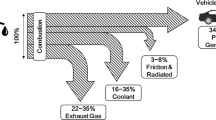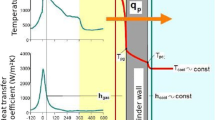Abstract
Recently, precise analysis of energy flow in engines has become necessary to improve fuel economy. An integrated engine thermal management model, which is introduced in this paper, is suitable for that process. The model consists of six sub-models for thermal mass, coolant, lubricant, heat transfer, friction, and exhaust. The sub-models are coupled to each other and they exchange heat and signals. Combustion energy flow analysis and temperature estimation of the engine components and working fluids were simulated under various conditions. Simulation results were compared with experimental data and they showed good agreement. Then, a variable-speed water pump (VSWP) to control coolant flow was applied in place of a conventional water pump. Engine warm-up time decreased with proper coolant flow control, and fuel economy could be improved by 2.5%.
Similar content being viewed by others
References
J. F. Eberth, J. R. Wagner, B. A. Afshar and R. C. Foster, Modeling and validation of automotive smart thermal management system architecture, SAE (2004) 2004-01-0048.
A. Choukroun and M. Chanfreau, Automatic control of electronic actuators for an optimized engine cooling thermal management, SAE (2001) 2001-01-1758.
M. S. Choi, M. K. Park, S. H. Cho and S. J. Han, The effect of variable water pump control of diesel engine on decreasing fuel consumption. KSAE (2009) 09-B0025.
K. B. Kim, K. W. Choi, K. H. Lee and K. S. Lee, Active coolant control strategies in automotive engines. International Journal of Automotive Technology, 11(6) (2010) 767–772.
R. D. Chalgren and D. J. Allen, Light duty diesel advanced thermal management, SAE (2005) 2005-01-2020.
M. H. Salah, T. H. Mitchel, J. R. Wagner and D. M. Dawson, Nonlinear-control strategy for advanced vehicle thermalmanagement systems, IEEE Transaction on the Vehicular Technology, 57(1) (2008) 127–137.
J. R. Wagner, V. S. Srinivasan, D. M. Dawson and E. E. Marotta, Smart thermostat and coolant pump control for engine thermal management systems, SAE (2003) 2003-01-0272.
K. Bennion and M. Thornton, Integrated vehicle thermal management for advanced vehicle propulsion technologies, SAE (2010) 2010-01-0836.
F. Pirotais, J. Bellettre, O. L. Corre, M. Tazerout, G. D. Pelsemaeker and G. Guyonvarch, A diesel engine thermal transient simulation: couling between a combustion model and a thermal model. SAE (2003) 2003-01-0224.
W. Puntigam, T. Hörrmann, K. Schierl, B. Wiesler and J. Hager, Thermal management simulations by coupling of different software packages to a comprehensive system. SAE (2005) 2005-01-2061.
G. B. Lim, H. S. Wi, J. I. Park, J. H. Lee and K. S. Park, Effect of engine friction on vehicle fuel economy during warm-up. Transaction of KSAE, 16(6) (2008) 109–114.
J. R. Wagner, E. Marotta and I. Paradis, Thermal modeling of engine components for temperature prediction and fluid flow regulation. SAE (2001) 2001-01-1014.
R. Cipollone and C. Villante, A fully transient model for advanced engine thermal management. SAE (2005) 2005-01-2059.
C. Garnier, D. Dinescu, J. Bellettre, M. Tazerout, R. Haller, B. Hamery and G. Guyonvarch, Numerical study of heat losses in automotive engines during cold starts. Application to prediction of thermal deficit, SAE (2005) 2005-01-2039.
J. A. Kaplan, Modeling the spark ignition engine warm-up process to predict component temperatures, M.S. Thesis, Mechanical Engineering, Massachusetts Institute of Technology, Cambridge, Massachusetts, USA (1990).
LMS IFP-Engine library, 2008.
J. B. Heywood, Internal combustion engine fundamentals, McGraw-Hill Book Cooperation, New York, USA (1988).
T. Nakase, T. Saito, N. Kato, T. Kohama and Y. Masuda, The oil flow measuring method in engine lubrication. SAE (1999) 1999-01-3467.
A. Comfort, An introduction to heavy-duty diesel engine frictional losses and lubricant properties affecting fuel economy — part I, SAE (2003) 2003-01-3225.
K. W. Choi, K. B. Kim and K. H. Lee, Investigation of emission characteristics affected by new cooling system in a diesel engine, Journal of Mechanical Science and Technology, 23(7) (2009) 1866–1870.
Author information
Authors and Affiliations
Corresponding author
Additional information
Recommended by Associate Editor Oh Chae Kwon
Daebong Jung received his B. S. from the School of Mechanical and Aerospace Engineering at Seoul National University in 2007. He is currently a Ph. D candidate in the school of Mechanical and Aerospace Engineering at Seoul National University. His research interests are vehicle and engine thermal management, electrochemical battery simulation model, waste heat recovery system and control strategy for HEV.
Jinwoo Yong received his B. S. and M. S. from the School of Mechanical and Aerospace Engineering at Seoul National University in 2009 and 2011, respectively. He is currently an engineer in Renault Samsung Motors, Korea.
Hoimyung Choi received his B. S., M. S. and Ph. D degrees from the School of Mechanical and Aerospace Engineering at Seoul National University in 1996, 1998 and 2003, respectively. He is currently a research engineer in the Advanced Institute of Convergence Technology. His research interests are internal combustion engine simulation and experiment.
Hanho Song received his B. S. degree from the School of Mechanical and Aerospace Engineering at Seoul National University in 2003. He then obtained his M. S. and Ph. D degrees from the Department of Mechanical Engineering at Stanford University in 2005 and 2009 respectively. He is currently an assistant professor in the School of Mechanical and Aerospace Engineering at Seoul National University.
Kyungdoug Min received his B.S. and M.S. degrees from the Department of Mechanical Engineering at Seoul National University in 1986 and 1988, respectively. He then obtained his Ph.D. degree from M.I.T in 1994. He is currently a professor in the School of Mechanical and Aerospace Engineering at Seoul National University.
Rights and permissions
About this article
Cite this article
Jung, D., Yong, J., Choi, H. et al. Analysis of engine temperature and energy flow in diesel engine using engine thermal management. J Mech Sci Technol 27, 583–592 (2013). https://doi.org/10.1007/s12206-012-1235-4
Received:
Revised:
Accepted:
Published:
Issue Date:
DOI: https://doi.org/10.1007/s12206-012-1235-4




